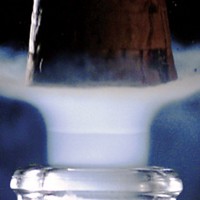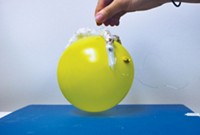Advertisement
Grab your lab coat. Let's get started
Welcome!
Welcome!
Create an account below to get 6 C&EN articles per month, receive newsletters and more - all free.
It seems this is your first time logging in online. Please enter the following information to continue.
As an ACS member you automatically get access to this site. All we need is few more details to create your reading experience.
Not you? Sign in with a different account.
Not you? Sign in with a different account.
ERROR 1
ERROR 1
ERROR 2
ERROR 2
ERROR 2
ERROR 2
ERROR 2
Password and Confirm password must match.
If you have an ACS member number, please enter it here so we can link this account to your membership. (optional)
ERROR 2
ACS values your privacy. By submitting your information, you are gaining access to C&EN and subscribing to our weekly newsletter. We use the information you provide to make your reading experience better, and we will never sell your data to third party members.
Education
Another Popcorn Breakthrough, Laugh for Your Heart, Just Joking, Real-life Matrix
by Deanna Miller
May 9, 2005
| A version of this story appeared in
Volume 83, Issue 19
For a while, researchers have known that popcorn kernels must have a moisture level of about 15% in their starchy center in order to explode. But what causes a kernel's center to fail to reach this moisture level? Bruce R. Hamaker, director of Purdue University's Whistler Center for Carbohydrate Research, and colleagues at Purdue and the University of Wisconsin, Stout, say the answer is leaky pericarps, which prevent the moisture pressure buildup required and lack the structure needed for the kernel to explode (Biomacromolecules, published online April 7, dx.doi.org/10.1021/bm049220l).
The researchers compared the microwave popping performance of 14 Indiana-grown popcorn varieties and examined the crystalline structure of the pericarps of both the popped kernels and the "swinging singles." The percentage of unpopped kernels ranged from 4% in premium brands to 47% in cheaper ones. Remaining challenges include reducing the occurrence of burnt popcorn and lowering the price of movie-theater popcorn.
In addition to getting 30 minutes of exercise three times a week, we're now supposed to laugh for 15 minutes per day (but not necessarily 15 minutes straight) to keep the vascular system in good condition. That's the advice of Michael Miller, associate professor of medicine and epidemiology at the University of Maryland Medical Center, Baltimore. Miller is the principal investigator in a recent study claiming to show for the first time that laughter is linked to the healthy function of blood vessels.
Previous studies found that mental stress leads to vasoconstriction of the endothelium, the inner lining of blood vessels, reducing blood flow. Miller's study confirms this and also demonstrates that laughter makes the endothelium dilate, increasing blood flow. Since hardening of the arteries starts at the level of the endothelium, Miller says, "it's conceivable that laughing may be important to maintain a healthy endothelium and reduce the risk of cardiovascular disease."
In the study, 14 of 20 healthy, nonsmoking volunteers experienced a reduction of brachial artery flow when they watched a mentally stressful movie segment. (It is unknown whether they were given popcorn and whether a high percentage of unpopped kernels added to their stress.) A laughter-inspiring movie clip caused vasodilation in 19 of the 20 volunteers. Details are at www.umm.edu/news/releases/laughter2.html.
R. Thomas Myers of kent, ohio, submitted these jokes:
◾ Q. What is quicksilver? A. Silver that has been formed into coins and therefore slips quickly through your fingers.
◾ Those who are retired are frequently said to be in their golden years. My experience has been that these are actually the iron pyrite years.
Japan's SONY has patented an idea, but not an invention, for transmitting data directly into the brain so that people can see movies and play video games in which they smell, taste, and feel things. It could also give people who are blind or deaf the chance to see or hear. The device would shoot pulses of ultrasound at the head to modify the firing patterns of neurons in targeted areas of the brain. The April 7 New Scientist says the patent marks the first step toward a "real-life Matrix," referring to the sci-fi movie trilogy. Fans were probably excited about this news until they remembered that the Matrix is an evil system for enslaving the human race.
This week's column was written by






Join the conversation
Contact the reporter
Submit a Letter to the Editor for publication
Engage with us on Twitter